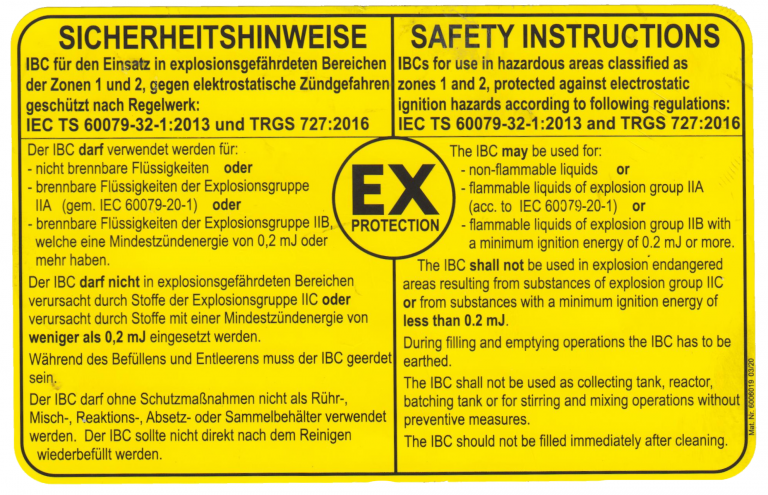What is an 'EX' rating and why is it so important?
The chemical industry is full of abbreviations or terms that can seem confusing to people who haven’t bought an IBC or drum before and it can be very easy to be caught out. EX, FSSC, UN – what to they all mean? Well below we will be going into ‘EX’, what it means, why is it so important and what can go wrong when it is ignored?

Above is an image of Schutz’s ‘EX Protection’ sticker, which is usually found at the front of the container either on the bottle itself, or on the metal jacket on an SX-EX.
But what does ‘EX’ actually mean? Generally known as Explosion Proof, Explosion Protected, Ex Proof, Ex Rated – used worldwide as simple ways to say, “explosion resistance.” Some people might refer to it as “flame resistance” too but this is generally misleading and not entirely correct. In basic terms, an EX rated container cannot be the source of ignition. If an external factor heats the IBC up to a point where the liquid inside ignites, in a warehouse fire for example, then the explosion is kept within the container. So in keeping with basic science, a fire needs an ignition source, a fuel and oxygen; an EX container removes one of these three elements to keep the liquid inside it safe.
We get asked almost daily; “Can I store petrol in an IBC?”, or “Can I store diesel in an IBC?” and the answer is yes BUT only if it is in an EX rated IBC, like our MX-EX or SX-EX containers that have been earthed. How do you earth an EX-Rated IBC? Attach a small static line from the cage and make sure it is touching the ground, it’s as simple as that.
The biggest frustration as an industry that we all have is IBCs being sold incorrectly on online market places such as eBay. These adverts are usually written by people who want a quick sale and do not understand the dangers behind advertising an non-EX IBC as “OK to take fuel”. A non-EX IBC has no earthing lead in it’s valve and can easily create a static spark as liquid is pumped into or out of the IBC, as the liquid moves around against the plastic creating a buildup of energy. One spark is all it takes for 1000L of petrol or diesel to go bang with horrifying consequences.
In the video below you can see the disasterous effects of pumping a flammable liquid – in this instance likely Acetone – without anti-static lines and without earthing or EX-Type IBCs. Thankfully on this occasion everyone managed to escape the area.





